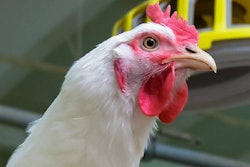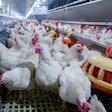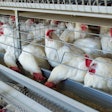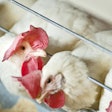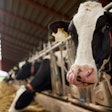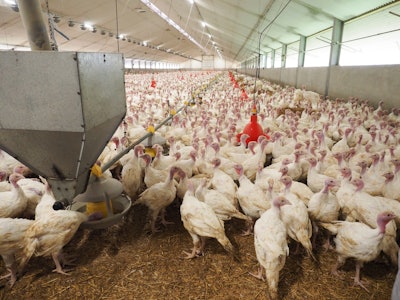
Biosecurity is critical to controlling the spread of avian metapneumovirus, also known as turkey rhinotracheitis or swollen head syndrome, in commercial turkeys, broilers and layers.
What is AMPV?
Avian metapneumovirus (AMPV) can induce highly contagious respiratory disease in all species of commercial poultry, as well as wild birds, and result in a drop off in egg production and quality in layers and broiler and turkey breeder hens. Respiratory symptoms include ocular and nasal discharge, frothy eyes, conjunctivitis, swollen sinuses, sneezing and coughing, depression and ruffled feathers.
While AMPV is grouped in subtypes A to D, strains A & B are the root of a nearly all cases present in the United States.
Mortality associated with AMPV infections is often caused by secondary bacterial infections, such as E. coli. There is no treatment for AMPV infections once they occur.
“You can treat the secondary infections,” explained Dr. Raquel Burin, a technical account manager for poultry at Zinpro Corp., “but prevention is key.”
Diagnosis of AMPV occurs post-mortem through either PCR or serology.
The respiratory disease first appeared in South African turkeys in the late 1970s and has now been detected in every major poultry producing area globally except for Australia. Avian metapneumovirus cases were reported throughout Canada in the summer of 2024. The U.S. Department of Agriculture (USDA) does not officially track avian metapneumovirus cases, but the virus is likely present in most poultry producing states.
Biosecurity is key
Proper biosecurity remains vital for prevention of avian metapneumovirus and other contagious diseases in poultry, she said.
Fomites – physical carriers of contaminants like people, equipment, egg handling materials, feed sacks, wild animals or free-flying birds – can carry diseases between farms. Because of this, it is important that farms follow an all-in all-out concept, increase sanitation of all materials and implement strict employee sanitation practices.
Other farm biosecurity measures include keeping a visitor log, limiting people from visiting other farms within a certain time period and the use of personal protective equipment (PPE).
Interventions for immune health
Because secondary infections are a common cause of mortality with poultry infected with AMPV, finding ways to boost immune are critical, Burin added.
Nutritional supplements that contain trace minerals or essential oils could help improve the integrity of epithelial tissue and fuel the immune system of birds, which helps prevent poultry pathogens, research suggests.
Vaccination against AMPV in U.S./outside U.S.
Outside the U.S., both live and inactivated vaccines are commonly used to immunize chickens and turkeys against avian metapneumovirus.
Live vaccines, applied via spray or drinking water, can stimulate both local respiratory and system immunity against the disease. However, live vaccines may offer only short-term protection and repeated vaccination in turkeys in common.
Inactivated AMPV vaccines are used as boosters in layer and breeder flocks are initial immunization with live vaccines.
The U.S. Department of Agriculture approved the use of an autogenous AMPV vaccine for commercial poultry in August 2024. This is the first AMPV vaccine to receive regulatory approval by the government agency.




